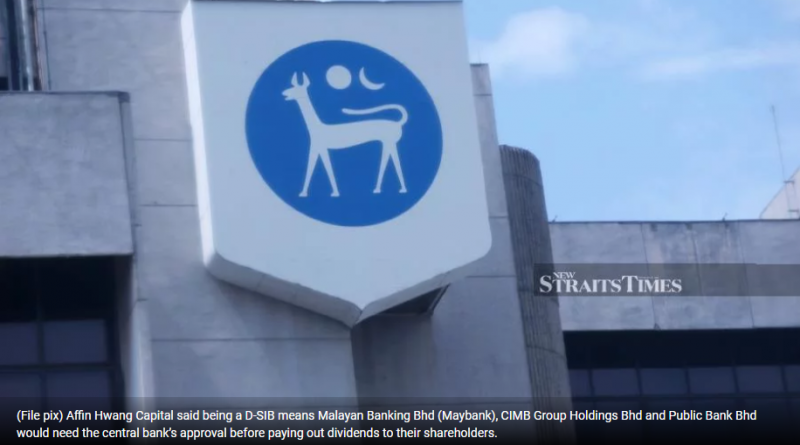Malaysian banks’ dividend payouts affected by D-SIB status?
KUALA LUMPUR: Malaysia’s three biggest banks could see their dividend payouts affected by Bank Negara Malaysia’s move that designate them as Domestic Systemically Important Banks (D-SIB).
Affin Hwang Capital said being a D-SIB means the ability of Malayan Banking Bhd, CIMB Group Holdings Bhd and Public Bank Bhd to pay higher dividends could potentially be constrained by the requirement to maintain higher capital buffer.
“But that said, any approvals come from Bank Negara and also depends on the ability of these D-SIBs to generate higher profitability,” Affin Hwang said today.
Bank Negara had on February 5 issued a policy document on the D-SIB framework.
D-SIBs refer to banks whose distress could potentially cause considerable disruption to the domestic financial system and the wider economy.
As a result, Bank Negara said the D-SIBs would need to maintain higher capital buffers (at the consolidated level), which is to meet higher loss absorbency (HLA) requirement.
The applicable HLA requirement for Maybank and CIMB are at 1.0 per cent, while Public Bank at 0.5 per cent of risk-weighted assets at consolidated level.
“In our view, these banks already have sufficient common equity tier-1 (CET-1) capital level which are ahead of Basel 3 requirements and as such, do not need to raise additional equity capital unless their capital ratios dipped below the requirements set by Bank Negara,” Affin Hwang said.
It pointed that as at September 30 last year, the CET-1 ratio of Maybank stood at 14.4 per cent, CIMB Group at 13.1 per cent and Public Bank at 13.1 per cent – all of which are well ahead of Basel 3’s regulatory requirement of 7.0 per cent.
Nevertheless, Affin Hwang believes that the overall sector implication was minimal and that these D-SIBs did not have to resort to raise additional equity capital, at current level.
Affin Hwang maintained its “neutral” sector call on the banking sector, noting that earnings catalysts were lacking while loan growth may moderate further to three per cent in 2020 due to lacklustre business and consumer sentiment.
“At this juncture, we foresee a contraction in sector core earnings per share of 1.8 per cent year-on-year in 2020 and flat growth in 2021,” it said.
Source: NST

